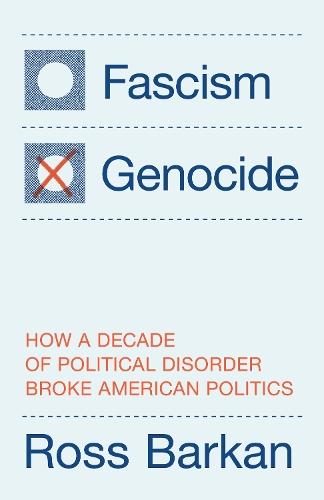
Fascism or Genocide: How a Decade of Political Disorder Broke American Politics
Publishing Details
Fascism or Genocide: How a Decade of Political Disorder Broke American Politics
By (Author) Ross Barkan
Verso Books
Verso Books
4th November 2025
United Kingdom
Classifications
General
Non Fiction
Political parties and party platforms
Corruption in politics, government and society
320.973
Physical Properties
208
Width 129mm, Height 198mm, Spine 17mm
260g
Description
Fascism or Genocide is New York Times Magazine writer Ross Barkans sweeping report on the 2024 US election and the decade of political upheaval that led up to it. From the primary season that set up Biden and Trump to face off for the second time, to the dramatic replacement of Biden by Harris, to Trump's total victory, Barkan tells a riveting story of epochal political disenchantment and chaos. The spectre of two elderly men waging a retread campaign has alienated large swaths of the electorate. During the Democratic primary season, more than half a million Americans across the country cast votes for Uncommitted ballot options to send the Democrats a message about the urgent need to end the killing in Gaza. These voters contrast with the sentiments of mainstream liberals, who believe Trump poses an existential threat to democracy and that the Democrats must be saved despite their failure to respond to vast swathes of the electorate's demands. And yet millions of Democratic voters stayed home and sit the election out. As the director of an influential Palestinian advocacy group told Barkan, Its a choice between genocide or fascism."
Reviews
One of the sharpest state policy minds I know * Alexandria Ocasio-Cortez *
A writer with real literary flair. Like I.F. Stone, Barkan works independently with a left point of view, but its his shoe leather, his working the phones and hitting the street, that's invaluable because, sadly, its so scarce * Christian Lorentzen *
Author Bio
Ross Barkan is a contributing writer to the New York Times Magazine. He is the author of two novels and The Prince: Andrew Cuomo, Coronovirus, and the Fall of New York. Washington Post columnist Shadi Hamid called him consistently one of the most interesting and original essayists of his generation. His essays have appeared in The Atlantic, The New Yorker, GQ, and the Columbia Journalism Review, among others
